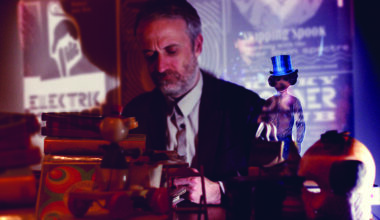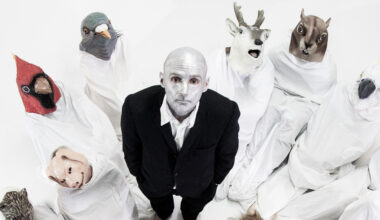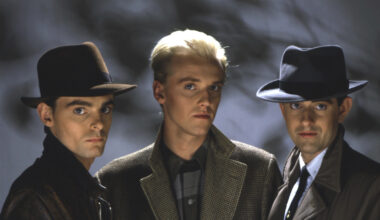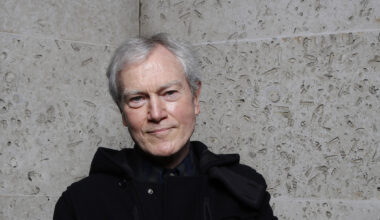It’s the twice-monthly podcast that everyone’s talking about: featuring off-the-wall updates from a fictional backwater community, it’s time to say hello to ‘Welcome to Night Vale’
“Your existence is not impossible, but it’s also not very likely. Welcome… to Night Vale”
‘Welcome To Night Vale’: episode 16, ‘The Phone Call’
“We call it Weirdtown, USA,” says Jeffrey Cranor, the co-creator of cult podcast ‘Welcome To Night Vale’. The fabricated American Southwestern desert town of Night Vale is by no means the first Weirdtown, USA; satire has Springfield and South Park, while the Washington town of David Lynch’s ‘Twin Peaks’ ushered in some fantastically freaky TV moments.
Night Vale is a place fraught with danger, where clouds are something to fear, yet in certain vague circumstances can be elected into public office. The home of demonised librarians; where the existence of angels is evident yet denied; where unspeakable danger lurks in seemingly innocuous public places; where wheat and wheat by-products kill everyone, and where a solitary community radio announcer makes everything sound just as quotidian as where you live.
“Cecil Palmer spoke of the horrors of everyday life. Nearly every broadcast told a story of impending doom or death, or worse: a long life lived in fruitless fear of doom or death”
‘Welcome To Night Vale: A Novel’ (2015)
Like so many great pairings – Lou Reed and John Cale, Alan Vega and Martin Rev, Bert and Ernie – Cranor and Night Vale co-founder Joseph Fink met in New York. In their case, it was at the twilight end of the 2000s, through a left-field Manhattan performance art collective called The Neo-Futurists.
“We did a weekly show where we’d have a constantly changing collection of 30 short plays, where all the titles would be on pieces of paper hung on a clothesline,” says Cranor. “When we’d finish one, the audience would shout out a number and we’d perform the one they’d picked.”
Cranor was already a member when Fink began volunteering, and the pair developed an appreciation of each other’s writing. They ended up meeting every two weeks to write over beer.
“One day Joseph said, ‘We should do a podcast’,” says Cranor. “It was just one of those random ideas we talked about. Then out of the blue he emailed me a file and it was the complete pilot episode for ‘Welcome To Night Vale’.”
Launched in 2012, the podcast took the form of a community radio broadcast presented by Cecil Palmer, played wonderfully by fellow Neo-Futurist, Cecil Baldwin. The format of the twice-monthly podcast has never changed; it’s still Cecil, talking about local news, safety warnings and his love life.
“It’s a restrictive format, but that’s good,” says Cranor. “Having a single narrator forces you to say, ‘What can he see? How does he know what’s happening? How does he receive information?’.”
“Life in Night Vale is more stressful. There are things lurking in the shadows. Not the projections of a worried mind, but literal Things, lurking, literally, in shadows”
‘Welcome To Night Vale: A Novel’ (2015)
“We both sort of grew up in suburban cities,” says Cranor. “I grew up on the periphery of Dallas in a town called Mesquite, and I listened to a community radio station all the time. Joseph grew up on the eastern edge of the desert in the Californian city of Camarillo. We were both on opposite ends of the American Southwest that we write about.”
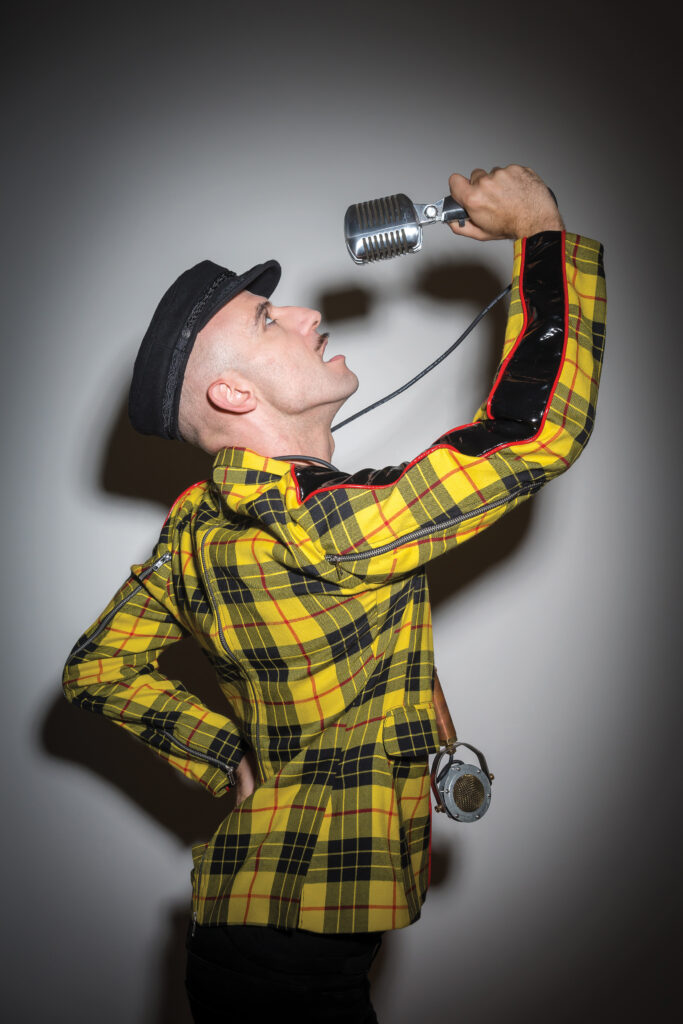
The inspiration for their own Weirdtown, USA came from things like ‘The Twilight Zone’ and ‘Alice’s Adventures In Wonderland’.
“I like the idea that things can either be normal, or terrifying,” says Cranor. “When a character responds to something with horror, then that makes us empathetically terrified. But when a character responds to something weird as if it’s normal, that’s actually more horrifying. I also grew up reading absurd observational things about the world. Balancing the weird and the horrible with pithy humour is something I’ve always been interested in.”
Despite its wry moments, there is also a more sinister, Orwellian edge to the goings-on in Night Vale. The local government is oppressive and Cecil Palmer is its unsuspecting public advocate. There’s a sense of constant surveillance, of restricted freedoms (including a full ban on pencils and paper), and yet Cecil will also mention things like Facebook or air travel, all of which seem incongruent with the town’s totalitarian ringfence.
“Joseph’s original concept for the show was a place where every conspiracy theory is true,” explains Cranor. “In Night Vale, there’s the idea of a government that’s both covertly, and overtly, authoritarian. At the heart of many conspiracies is the underground, the secret police, and yet here they’re out in the open and Cecil’s like, ‘Well of course we have secret police. Who else is going to coordinate everything to make our lives safe?’.”
“And now, the weather”
Cecil Palmer, every ‘Welcome To Night Vale’ podcast episode
Music is central to the strange, unsettling atmosphere of Cecil’s daily broadcasts. Just behind his words, right on the cusp of audibility, are compositions by the New York electronic musician Disparition (Jon Bernstein) whose ‘Ballad Of Fiedler & Munt’ also forms the ghostly title tune. His pieces are often wonky, nightmarishly haunting or even twee, but you can never quite hear them properly. It’s the art of wilful obfuscation, a trick that means you once again never really know what’s going on.
Another musical constant in every ‘Night Vale’ broadcast is the moment when Cecil announces the nightly weather forecast, which turns out to be a song rather than a traditional bulletin – and one that’s never got anything to do with meteorological matters. The first weather forecast was performed by co-founder Fink, but since then a host of mostly unknown artists have had their songs featured in the podcast, which gives rise to the kind of profile-raising that is nigh-on impossible to achieve in music today. In one week, the podcast was downloaded 150,000 times. Every song, ranging from Dylan-esque folk to assbackwards hip hop, is hand-picked by the pair.
One of the artists whose music appeared on the weather was Mary Epworth, who was subsequently invited to supply the music for Cranor’s Night Vale spin-off podcast , ‘Within The Wires’, where she also voices characters on occasion. ‘Within The Wires’ takes Night Vale’s oddness and transfers it to what purports to be an unearthed treasure trove of tapes, including narrated tours of an exhibition at London’s Tate Modern, some 29 years before it was actually a museum.
Fink also has his own spin-off, ‘I Only Listen To The Mountain Goats’, and there are several other shows and ideas in the stable. As well as a number of books, including ‘Welcome To Night Vale: A Novel’, our conversation took place at the end of a sell-out European tour, complete with Cecil delivering broadcasts to the audience and live accompaniment from Disparition.
“For me it’s always been about creating cool stuff and doing it independently,” reflects Cranor, musing on how successful the Night Vale enterprise has become.
“I have to accept that this is my full-time job now. I couldn’t be happier, and I literally can’t think of anything more fun to do. Now maybe if you ask me on a different day when something’s super stressful I’ll be like, ‘Ah man, I really miss my old data-entry job’.”
Find ‘Welcome To Night Vale’ at nightvalepresents.com

